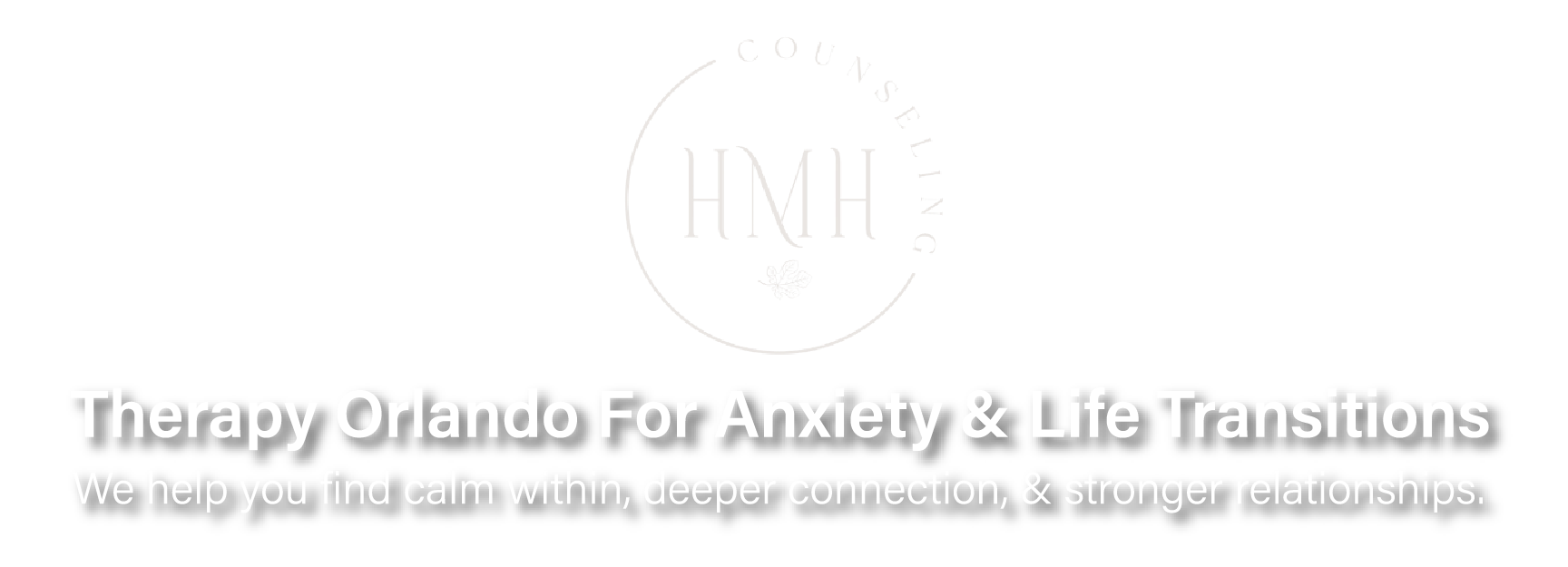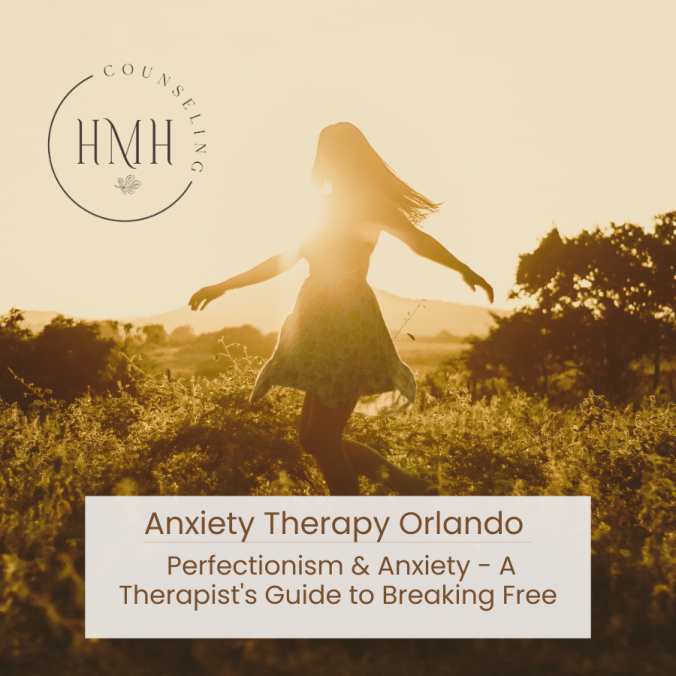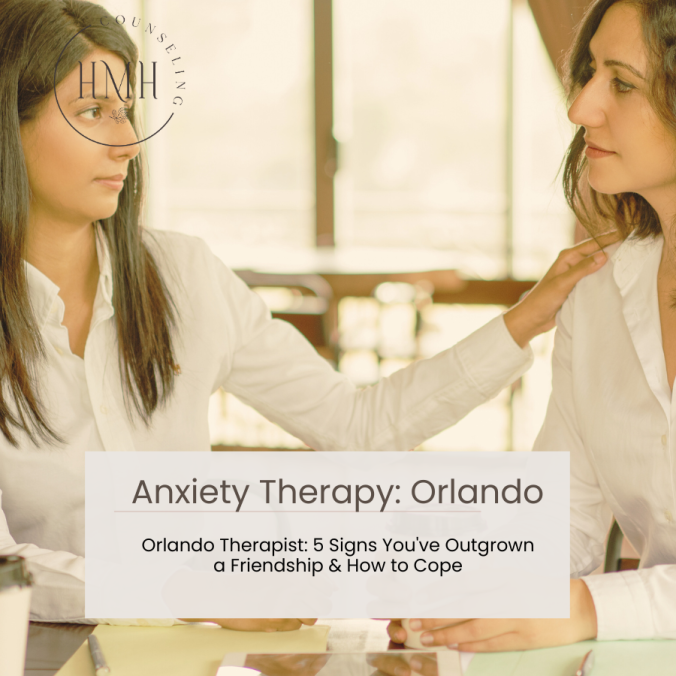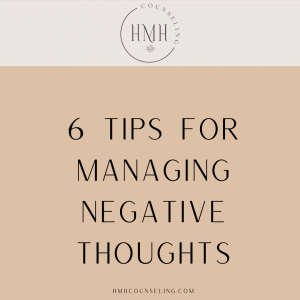July 2 • Written by: Jennifer Sierra, LMHC
You probably know the feeling. You’re triple-checking your work, staying late to make sure everything is “just right,” maybe even getting praised for your high standards… until you’re not. Suddenly, you’re paralyzed by the fear of making mistakes. Your inner critic is louder than ever. You procrastinate on important tasks because nothing feels good enough to start.
If you’ve hit this wall, you’re not a failure. You’re not incapable. You’re probably just caught in perfectionism’s anxiety trap—trying to achieve an impossible standard that’s actually working against you.
At Holistic Mental Health Counseling, we work with high-achieving individuals daily who struggle with this perfectionist anxiety. We understand that perfectionism often masquerades as a strength, though it can become a source of intense anxiety and self-doubt.
However, it doesn’t have to be this way. Here’s the truth: High standards can be helpful, but perfectionism is a slippery slope. The good news? Perfectionism doesn’t have to be your prison—and recognizing when it stops serving you is the first step toward freedom.

If you find your anxiety becoming overwhelming or it is interfering with daily life, remember that professional help is available. At HMH Counseling, led by Jennifer Sierra, LMHC, we specialize in anxiety therapy . We help high achieving professionals daily to break free from perfectionist anxiety. We understand that pursuing excellence and being trapped by perfectionism feel very different—and the difference matters for your healing journey.
Healthy Striving vs. Perfectionism: They’re Not the Same
Healthy striving in itself isn’t the enemy. In fact, having standards can be helpful. It motivates us to do quality work, show up prepared, and take pride in our accomplishments. But when striving becomes rigid—when “good enough” never feels good enough—it shifts into something more harmful: perfectionism.
Perfectionism is sneaky. You might start noticing that you’re avoiding new challenges, spending excessive time on minor details, or feeling devastated by small mistakes. You’re still achieving, but it’s getting harder. You may feel like an imposter or like your usual confidence just isn’t there anymore.
If that pressure keeps building without flexibility or self-compassion, anxiety sets in. Perfectionist anxiety is more than just wanting things to go well. It’s the constant fear of failure, harsh self-criticism, and a growing sense that you’re never quite measuring up. It’s the moment you realize you’re running on fear—and even success doesn’t quiet the inner critic.
The progression below shows how perfectionism feeds anxiety. It’s important to recognize where you are in this cycle and to know that freedom is possible—but it takes self awareness and intention, not just trying harder.
The Perfectionism-Anxiety Cycle
Step 1: Healthy Standards
You start with reasonable goals and quality expectations
⬇️
Step 2: Rigid Expectations
Standards become inflexible – “It must be perfect or it’s worthless”
⬇️
Step 3: Fear of Failure
Overwhelming worry about making mistakes or not meeting expectations
⬇️
Step 4: Procrastination/Avoidance
Delaying tasks or avoiding challenges to prevent potential failure
⬇️
Step 5: Increased Anxiety
Stress builds as deadlines approach and tasks remain unfinished
⬇️
Step 6: Perfectionist Paralysis
Complete inability to start or complete tasks due to overwhelming pressure
Sound familiar? You’re not alone in this cycle. The good news is that recognizing these patterns is the first step toward breaking free from perfectionist anxiety.
The Real Cost of Perfectionist Anxiety
Unchecked perfectionism doesn’t just make you work harder—it rewires your nervous system for constant vigilance. And that has ripple effects:
- Chronic anxiety and worry about making mistakes
- Procrastination and avoidance of challenging tasks
- Imposter syndrome and self-doubt
- Relationship strain from unrealistic expectations
- Decision paralysis from fear of choosing wrong
- Burnout from never feeling “done”
- Even depression when nothing feels good enough
You can’t just “lower your standards” to fix this. And no— achieving the next success will not silence your inner critic long term.
Breaking Free Starts With Awareness

This is where the shift begins. Whether you’re a student, professional, or parent, your struggle with perfectionism affects every area of your life.
If you’re constantly revising, avoiding risks, and never celebrating wins because you’re already focused on what’s next, you’re teaching your nervous system that nothing is ever safe or sufficient.
But when you practice self-compassion, challenge your inner critic and give yourself permission to embrace your beautiful imperfections, that is where authentic confidence begins.
One Small Thing You Can Change Today:
Take a quick inventory of your perfectionist patterns.
- Do you spend excessive time on minor details?
- Avoid starting projects until you feel “ready”?
- Feel devastated by small mistakes or criticism?
Pick one behavior you want to shift this week—just one.
Maybe it’s submitting the report that’s 90% great instead of spending three more hours perfecting it.
Maybe it’s trying something new without researching it to death first.
Breaking free from perfectionism doesn’t start with lowering your standards. It starts with self-compassion and recognizing the difference between success and your self-worth.
Need Support for Perfectionism, Anxiety, or Self-Criticism?

At HMH Counseling, we offer compassionate, evidence-based therapy with a focus on anxiety therapy, perfectionism recovery, and building authentic self-confidence for individuals navigating the perfectionism-anxiety cycle.
We help clients recognize perfectionistic patterns, develop self-compassion, and build resilience—personally and professionally. Real change starts with small, intentional shifts toward being “good enough.”
Let’s get you back to thriving, not just surviving.
Ready to Start Anxiety Therapy?
Jennifer Sierra, LMHC with Holistic Mental Health Counseling Orlando, is here to support you in breaking free from perfectionism’s grip. If you’re ready to develop a healthier relationship with yourself and navigate life’s challenges with greater confidence and clarity, we’re here to help.
Contact HMH Counseling today to schedule your consultation.
Not Quite Ready for Anxiety Therapy?
At Holistic Mental Health Counseling, we understand how challenging perfectionist anxiety can be—and how overwhelming it might feel to take the next step toward support. You’re not alone in this. While you’re navigating this journey, I invite you to explore the blogs below.
Therapy Orlando Anxiety Resources
Anxiety Therapy Orlando: 7 Natural Anxiety Relief Tips from an expert Holistic Therapist
3 Holistic Approaches to Calm Perfectionist Anxiety This Summer
Stress & Anxiety Therapy Orlando: Beyond Normal Stress – When to Seek Help
Anxiety Therapy Orlando: Unmasking Anxiety: Exploring the Root Causes
Anxiety Therapist Jennifer Sierra

Jennifer is an Orlando-based therapist specializing in anxiety and life transitions through compassionate, creative approaches. As a Licensed Mental Health Counselor and Certified Integrative Mental Health professional with 20 years of experience, Jennifer thoughtfully balances traditional talk therapy with holistic interventions to help clients find calm and strengthen relationships. Beyond her private practice, Holistic Mental Health Counseling, Jennifer maintains a heart for community involvement and mental health awareness through volunteer work, workshops, and speaking engagements. To learn more about one-on-one therapy services or professional events, you can contact Jennifer here.
About Holistic Mental Health Counseling
HMH Counseling specializes in helping clients overcome anxiety, perfectionism, and self-criticism. Our goal is to help individuals feel confident in their abilities, at peace with their imperfections, and connected to their authentic selves. We provide evidence-based therapy that honors your strengths while addressing the patterns that no longer serve you.
Our services include anxiety therapy, depression therapy, holistic mental health therapy, and life transitions therapy. We work with individuals ready to create lasting change in their mental health and well-being.
Disclaimer: The content provided on this blog is for informational purposes only and is not intended to serve as professional advice, diagnosis, or treatment. The information shared is based on our understanding and interpretation of various mental health topics. It is important to recognize the complexity of mental health issues, and the advice provided here may not address the specific needs of every reader. The content on this blog should not be considered a substitute for professional advice from a qualified mental health professional. Always seek the advice of a licensed therapist or other qualified mental health provider with any questions or concerns you may have regarding your mental health or well-being.









